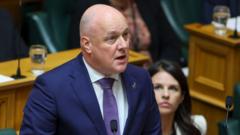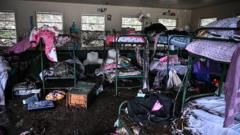Following a sweeping inquiry revealing decades of abuse in New Zealand's care institutions, Prime Minister Christopher Luxon has issued an official apology on behalf of the government. Vulnerable communities, especially Māori and Pacific peoples, were significantly affected. The government is committed to reforming the care system, though survivors demand concrete actions beyond words.**
**New Zealand Government Confronts Past with Apology Amid Care Home Abuse Inquiry**

**New Zealand Government Confronts Past with Apology Amid Care Home Abuse Inquiry**
**Prime Minister Luxon expresses regret for long-standing care home abuses and promises comprehensive reforms in response to extensive inquiry findings.**
New Zealand's Prime Minister Christopher Luxon has issued a historic apology to the thousands affected by abuse within state and faith-based care homes, following a damning inquiry report revealing systemic failings that spanned several decades. The formal acknowledgment, made during a parliamentary session, responds to findings that approximately 200,000 children and vulnerable adults faced various forms of abuse from 1950 to 2019, with significant impacts on Māori, Pacific communities, and individuals with disabilities.
Luxon expressed remorse to survivors on behalf of all past and present governments, stating, “This was an atrocity that should never have happened.” His comments reflected the inquiry's extensive revelations, including acts of rape, forced sterilizations, and exploitation, which the report deemed among the worst in the nation’s history. As he delivered this apology, survivors, advocates, and concerned citizens followed the developments either in person or virtually, highlighting the importance of the moment.
Though the inquiry, which lasted six years, is seen as a critical step toward justice for the victims, many survivors argue that apologies alone are insufficient without actionable plans for restitution and systemic reform. Tupua Urlich, a Māori survivor who testified before the inquiry, emphasized the need for meaningful change, asserting, “Words without actions leave us empty.”
As the government commits to address the inquiry’s 100-plus recommendations—including public accountability from institutions and measures to better protect children—the specifics of a compensation scheme for survivors remain pending, with details expected next year. Luxon announced an immediate financial injection of NZ$32 million into current support systems while confirming progress on several other recommendations.
The government has also initiated legislative changes aimed at improving oversight and protecting those in care, as evidenced by a new bill introduced following the apology. Luxon declared November 12th a National Remembrance Day to honor the affected individuals, reiterating the government's shared responsibility to eradicate such injustices moving forward. “This is not just a government matter, but a societal one,” Luxon concluded, reinforcing the commitment to ensure a safe future for all children in care.
Luxon expressed remorse to survivors on behalf of all past and present governments, stating, “This was an atrocity that should never have happened.” His comments reflected the inquiry's extensive revelations, including acts of rape, forced sterilizations, and exploitation, which the report deemed among the worst in the nation’s history. As he delivered this apology, survivors, advocates, and concerned citizens followed the developments either in person or virtually, highlighting the importance of the moment.
Though the inquiry, which lasted six years, is seen as a critical step toward justice for the victims, many survivors argue that apologies alone are insufficient without actionable plans for restitution and systemic reform. Tupua Urlich, a Māori survivor who testified before the inquiry, emphasized the need for meaningful change, asserting, “Words without actions leave us empty.”
As the government commits to address the inquiry’s 100-plus recommendations—including public accountability from institutions and measures to better protect children—the specifics of a compensation scheme for survivors remain pending, with details expected next year. Luxon announced an immediate financial injection of NZ$32 million into current support systems while confirming progress on several other recommendations.
The government has also initiated legislative changes aimed at improving oversight and protecting those in care, as evidenced by a new bill introduced following the apology. Luxon declared November 12th a National Remembrance Day to honor the affected individuals, reiterating the government's shared responsibility to eradicate such injustices moving forward. “This is not just a government matter, but a societal one,” Luxon concluded, reinforcing the commitment to ensure a safe future for all children in care.























